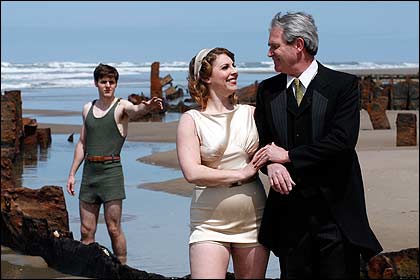
Should Have Known Better
Sarah Ruhl’s Eurydice deals in love, grief and betrayal at the Leebrick
by Suzi Steffen
Greek myth remains a powerful force, its concerns shaping Western literature even in an age that believes more in scientific than fictional narratives. Sarah Ruhl acknowledges 21st century ironic difference in Eurydice, now playing at the Lord Leebrick Theatre, but reaches back to ancient Greece and completes the atmospheric play with dollops of Freud, Shakespeare, Sartre and Tim Burton.
 |
| Orpheus (Peter Vergari), Eurydice (Alexis Schaetzle) and Father (Bary Shaw). photo by Max Maltz |
For those steeped in Western culture, the play feels familiar, its strands known, read and re-read. But Ruhl braids the old tales and a timeless present into a shiny dangerous gleaming thing, rich and strange, tumbled about under the waves of metaphor until it’s smooth and cautionary. The cautions come from the characters’ missteps: Don’t seek to know too much about others, Ruhl warns, and as Claudius says to his nephew in Hamlet, take care not to feel an excess of grief.
The plot revolves around rotten chance, belief in impossible communication, a long climb and a much longer fall. The living make choices, breathe between the gaps of meaning, pick words badly. They make promises they cannot keep, that no one could keep, and their best is never enough.
To the broad outlines of the Orpheus/Eurydice tale, Ruhl adds a father character (Bary Shaw, who’s a warm, careful parent to Alexis Schaetzle’s Eurydice) and Lethe, the river of forgetfulness. Unlike most tellings, which focus on Orpheus’ prodigious talent and anguish, Ruhl’s piece zeroes in on Eurydice, a young woman who finds “interesting” the stories of others’ lives. She reads maniacally and tells music-obsessed Orpheus (Peter Vergari) that she wants to understand the stories of the people in the books. “It’s interesting to see how some people’s lives end up well and others badly,” she says. Oh yes, Eurydice, it is.
Orpheus sings to her. “Will you remember my melody?” he asks. She promises. But she’s distracted by their upcoming wedding and her father, who’s missing from the picture — who misses her as well.
Then enters the character called A Nasty Interesting Man (Cameron Carlisle). Carlisle channels Johnny Depp’s Mad Hatter, among others, and skilfully displays his character’s game — he’s an omniscient deity, roughly paddling his fingers through human souls. This alarming, seductive creature stumbles over Eurydice on her wedding night, susses her up at once and casually, cruelly teases her about her literary analysis while preparing a narrative for her that she won’t be able to analyze, making for her a place where no choice is good.
Where Eurydice ends up, one choice seems to be becoming a jaded observer. “We are a chorus of stones,” announce three women (Bobbye Sorrels, Leslie Murray and Sharon Sless, all quite strong and wonderfully costumed by Sarah Gahagan). They serve as mid-level functionaries, occasional Harpies and the three-headed dog Cerberus, guarding the gates of Hell. The chorus urges, warns and reacts to the characters who find themselves in Hades. But the dead have their own agendas, their possibly unbreakable bonds — if they can only remember.
Some characters have an ability — or curse — to resist forgetting. That’s a gift when they remember connection amid the lonely disconnect of the underworld, but it’s a burden as well, one that creates agony for everyone in a place where no good deed goes unpunished.
Eurydice should have known better, on several occasions. Orpheus should have known better. Her father should have known better. That they don’t, and that they never will, is something the chorus of stones understands and plays upon.
Though the action can seem deliberative, and though one of the crucial moments needs more in-the-moment apparent motive, Eurydice serves up a strong conclusion to the Leebrick’s season.
The lovely diagonal set by Brad Steinmetz, with its many chandeliers and oversized chest of drawers, underscores Ruhl’s devotion to chronicling middle-class love, loss and disruption. Music composed by the wildly talented Brandon Rumsey doesn’t break the audience’s heart, but then, this play isn’t about Orpheus.
This is a play about Story, and this Story is hard, sad, lonely and worthy.
Eurydice runs through June 6 at the Lord Leebrick Theatre. Tix at lordleebrick.com or 541-465-1506.